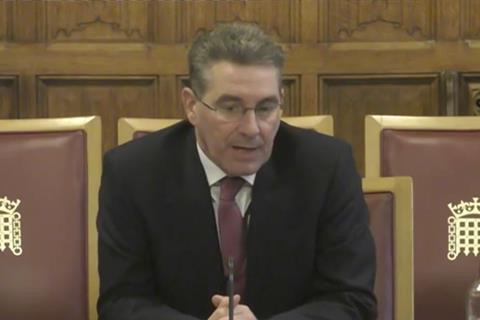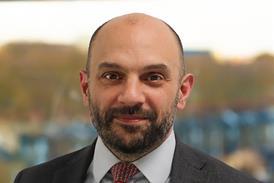Some 40 suspected cases of 'SLAPPs' - strategic litigation against public participation - are under investigation by the Solicitors Regulation Authority, the SRA's chief executive said yesterday. Appearing before a House of Lords Committee, Paul Philip said he would consider seeking new powers to prevent wealthy individuals and corporations from abusing the legal process to gag journalists and critics.
A thematic review of the issue will be published in the next few weeks, Philip said. However he resisted calls to 'name and shame' firms identified as acting in this area or who were simply under investigation for alleged abuses of the litigation process.
Philip was appearing, alongside SRA general counsel Juliet Oliver, before the Communications and Digital Committee of the House of Lords which is investigating 'lawfare and free speech'. Members of the committee repeatedly questioned whether the regulator took the issue seriously - and raised doubts about its sanctioning powers.
Revealing that 'about 40 open matters' had come to the SRA's attention since May last year, Philip said that experience suggests that about half will have come to a conclusion by the middle of this year.
Committee chair Baroness Stowell of Beeston (Tina Stowell) questioned him on the speed of the process. Nine to 10 months is ‘the usual’ time for an investigation, Phillip said. No firms had yet been sanctioned for SLAPP conduct because the issue 'only came to our attention in late spring last year.' However Philip stressed that the regulator had been looking into the general issue of the aggressive conduct of litigation before this.

The SRA's fining powers came under particular criticism. Challenged that the £20,000 maximum fine ‘doesn’t sound very much’, Phillip told the committee that it had only just been increased from £2,000.
‘Wow,’ Stowell retorted.
’You don’t get a cup of coffee from [London firm] Mishcon de Reya for £20,000,’ Lord Lipsey (former newspaper editor David Lipsey) interjected.
‘It is a pea-shooter against a tank,’ Phillip agreed. He noted that the Solicitors Disciplinary Tribunal can impose higher fines.
In a further line of questioning, Lord Foster of Bath (Libdem former MP Donald Foster) suggested that AML controls should be applied to fees paid for legal advice rather than simply for transactional work. 'Should AML legislation be changed to take account of these sort of cases, SLAPPs?'
‘That’s an interesting question,’ Phillip said.
Committee members also asked about the relationship between law firms and ‘reputation managers’ and private investigators. Phillip said he would 'definitely take away' and ‘consider’ concerns about dealings with such businesses.
Stowell asked if SRA's thematic review would identify the firms working in this area. ‘I would hazard a guess, no,’ Phillip said, noting that the review was an ‘information gathering’ exercise and to name firms would involve giving them the right to respond. Phillip rebutted the proposal that the regulator ’name and shame’ firms under investigation, saying the time to make an announcement is following determination of the case.
He was also questioned on the SRA’s overall relationship with law firms. ‘Are they worried if you knock on their door?’ Stowell asked.
'If we knock on the door, they’re worried, yes,' Phillip replied. 'I don’t imagine we’re very popular with the profession… I imagine being contacted by the SRA is not something most solicitors would welcome.'
Summing up, Stowell said that the committee was 'pleased that the SRA has taken steps to draw attention to the danger of SLAPPs. However we feel there is a need for even more regulatory action to combat this kind of activity.'
The ideas coming out of the hearing had been ‘very useful’, Philip replied, saying that he was interested in Lord Foster’s idea of applying the AML regime 'more generally'.
Earlier, the committee heard that the lord chancellor has yet to respond to model anti-SLAPPs legislation published by a coalition of free speech groups in November last year. Meanwhile Conservative MP Bob Seely yesterday tabled proposals to punish 'legal gangsterism' with £1m fines under a private member's bill. The proposed measure is due for a second reading on 24 March.
This article is now closed for comment.



























13 Readers' comments